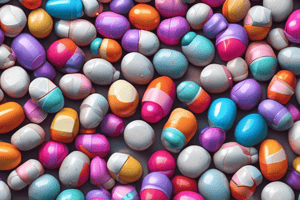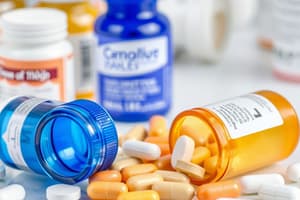Podcast
Questions and Answers
What is a characteristic of a generic drug?
What is a characteristic of a generic drug?
- It is created to be the same as an existing brand-name drug in quality. (correct)
- It is always more expensive than the brand-name drug.
- It has different safety standards than brand-name drugs.
- It may have a different route of administration than the brand-name drug.
Which of the following is NOT a focus in the creation of a generic drug?
Which of the following is NOT a focus in the creation of a generic drug?
- Safety
- Dosage form
- Performance characteristics
- Cost-effectiveness (correct)
How do generic drugs compare to their brand-name counterparts in terms of administration route?
How do generic drugs compare to their brand-name counterparts in terms of administration route?
- They must use the same route of administration as the brand-name drug. (correct)
- They use a simplified administration route.
- They can only be taken orally.
- They are administered via injection only.
In terms of strength, how should a generic drug relate to the brand-name version?
In terms of strength, how should a generic drug relate to the brand-name version?
What distinguishes a generic drug from a brand-name drug?
What distinguishes a generic drug from a brand-name drug?
Flashcards
Generic Drug
Generic Drug
A medication that is chemically identical to a brand-name drug, but is usually sold at a lower price.
Brand-Name Drug
Brand-Name Drug
The name given to a drug by the company that developed it - usually a trademarked name.
Route of Administration
Route of Administration
The way a drug is delivered to the body, e.g., pill, injection.
Dosage Form
Dosage Form
Signup and view all the flashcards
Performance Characteristics
Performance Characteristics
Signup and view all the flashcards
Study Notes
Definition of Generic Drugs
- A generic drug is a medication that is chemically equivalent to a brand-name drug.
- It has the same dosage form, safety profile, strength, route of administration, quality, and performance characteristics as the brand-name drug.
Key Characteristics of Generic Drugs
- Chemical equivalence: Generic drugs contain the same active pharmaceutical ingredient (API) as the brand-name drug.
- Bioequivalence: Generic drugs have similar bioavailability to the brand-name drug (meaning they are absorbed into the body at similar rates and amounts).
- Dosage Form: Generic drugs must have the same dosage form as the brand-name drug (e.g., tablet, capsule, liquid).
- Safety and Efficacy: Generic drugs must demonstrate comparable safety and effectiveness to the brand-name drug. This is determined through rigorous testing and comparison.
- Route of Administration: Generic drugs must be administered through the same route as the brand-name drug (e.g., oral, intravenous).
Comparison to Brand-Name Drugs
- Generic drugs are usually less expensive than brand-name drugs.
Regulation and Approval
- Generic drug development and approval are regulated by governmental agencies (e.g., FDA in the USA, EMA in Europe) to ensure safety and efficacy.
- The approval process for generic drugs is shorter and less expensive because they don't require the extensive testing that a brand-name drug does.
- Extensive testing for efficacy and safety is already completed in the brand-name drug's approval process.
Manufacturing and Quality Control
- Generic drug manufacturing facilities must adhere to strict quality standards.
- Quality control measures are stringent and regularly monitored by regulatory agencies.
- Rigorous quality control processes help maintain safety and efficacy of generic drugs.
Potential Differences (though uncommon)
- While generic and brand-name drugs are designed to be the same, there may be minor variations, particularly in inactive ingredients (e.g., fillers, binders).
- These differences in inactive ingredients are usually insignificant for the overall effectiveness and safety of the drug.
- Patients who have experienced adverse reactions to brand-name drugs may try a generic version.
- However, if a patient has allergies to inactive ingredients, or specific issues in processing (e.g., difficult swallowing when a certain inactive ingredient is used) it's essential to address those possible individual issues with the prescribing doctor.
Patient Implications
- Generic drugs offer a cost-effective option for patients needing prescription medications.
- The safety and efficacy of generic drugs are comparable to brand-name drugs.
- Patients who have concerns about whether a generic drug is the same as a brand-name drug should consult with their physician.
Studying That Suits You
Use AI to generate personalized quizzes and flashcards to suit your learning preferences.



